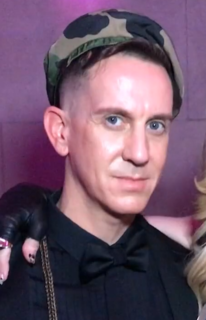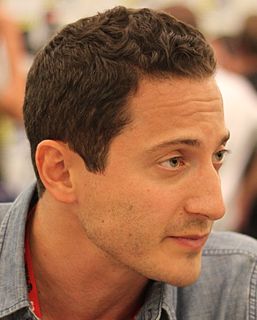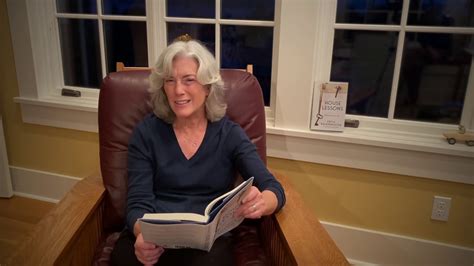A Quote by Jeremy Scott
I think as humans we're nostalgic creatures and that's what we do. We go back to things that have a semblance of something comforting, or enough time passes that it seems cool again, or maybe it's something that some people didn't even experience.
Related Quotes
Remember with your heart. Go back, go back and go back. The skies of this world were always meant to have dragons. When they are not here, humans miss them. Some never think of them, of course. But some children, from the time they are small, they look up at the blue summer sky and watch for something that never comes. Because they know. Something that was supposed to be there faded and vanished. Something that we must bring back, you and I.
I really hope that I can be as good as some people think I can be. But I may never work again... and that's the reality of the film industry. So, it's nice but I wouldn't want to go into something feeing like I needed to prove that I was good enough to be there. Maybe in some ways, it makes me think: "Do you know what? Some people think I'm alright, so maybe I should go into a job thinking I'm not rubbish." But I don't really think about it.
Humans metabolize their purchases very quickly, even if it seemed worth it for any number of reasons when you first bought it. After some time passes, people will go back to feeling the baseline feelings they had previously felt about themselves, no matter how shiny the object, the hair, or the experience.
You ride one in to the beach, and it's the most amazing thing you've ever felt. But at some point the water goes back out; it has to. And maybe you're lucky-maybe you're both too busy to do anything drastic. Maybe you're good as friends, so you stay. And then something happens-maybe it's something as big as a baby, or as small as him unloading the dishwasher-and the wave comes back in again. And it does that, over and over. I just think sometimes people forget to wait.
I think when I was doing my very first interviews, I probably brought a notepad and did ask people my first fifteen questions while sitting in a Starbucks or something horrible like that. And I found that, oftentimes, the most important thing at the very first interview is just establishing a personal connection and developing some sort of rapport so that I can go back to them again, and then maybe again, and maybe again after that.
I don't think all comedy should be mindless. Have something that's thoughtful. Maybe some things are tongue-in-cheek; maybe some things are very direct. I like that people have to think about things. That excites me. Because if you say certain things, it starts a dialogue. Even if you disagree, it's still a dialogue.
People tend to set themselves up in patterns; something happens, it hurts them, then something similar happens, and - it's happened again! It seems much bigger then, and they get worried and go through life looking for that thing, and because they're so concerned and looking for it, when anything that happens resembles that thing, they're sure it's happening again. So sometimes people think things are repeating even when they're not.
I'm fortunate enough that every job I do seems to be, at the very least, teaching me something fantastic. I make new friends. I work with talented people. And each project and experience seems to be better than the last. I seem to be topping myself all the time. I think to myself: "It can't get better, it can't get better..." And then something happens that makes me feel like I'm truly richer for the experience.
Just like I described in health care, yeah, somebody comes in, they got new ideas, maybe ideas that are completely opposite of my ideas. Maybe some of it goes, maybe some of that progress goes back. Maybe they think of some things we didn't think of, and so in some other areas - we can learn something.
There seems to be something in the zeitgeist, and maybe it's a function of - I'm no analyst, nor am I a psychologist - when you look at things and say, What if I could go back and change things? I think we live in a world right now where people are asking those questions a lot. What if we could go back and change what we did? How would we change the way we handled things in the Middle East, and how would we change things with the banking industry, and how would we change economic and educational issues?
What gets me back to church, I think, is thinking maybe this time that question "Is it true?" will be answered, not just in terms of somebody saying, "Yes, it's true," but something will happen in a sermon or maybe shuffling up to the Eucharist, or in the old lady who's sitting beside me with a Bible - maybe something will happen which will show me that it's true. So I go back thinking, maybe this time I'll be lucky.
I studied Comparative Literature at Cornell. Structuralism was real big then. The idea of reading and writing as being this language game. There's a lot of appeal to that. It's nice to think of it as this playful kind of thing. But I think that another way to look at it is "Look, I just want to be sincere. I want to write something and make you feel something and maybe you will go out and do something." And it seems that the world is in such bad shape now that we don't have time to do nothing but language games. That's how it seems to me.
I have trouble sometimes watching actors - even when they do a great job - with an accent. It kind of removes me, somehow. And maybe at some point, yeah, it could be a really cool experience. It's not something that I consciously think, "Oh yeah, I want to do a movie with an accent." Not to say that it couldn't happen.
We're living history all the time, in the papers, in the news, you think about stuff and it goes into your brain and you think about it and it comes out somehow. You have an idea; you've heard a phrase, or you're angry, or something disturbs you, or something seems paradoxical to you, you explore that idea, much like a writer would explore maybe an idea through metaphor. Maybe artists use their vehicle to explore ideas, so I think the things that interest me are the kind of idea of continuous change and how nothing stays the same and it's always disintegrating into something more.








































